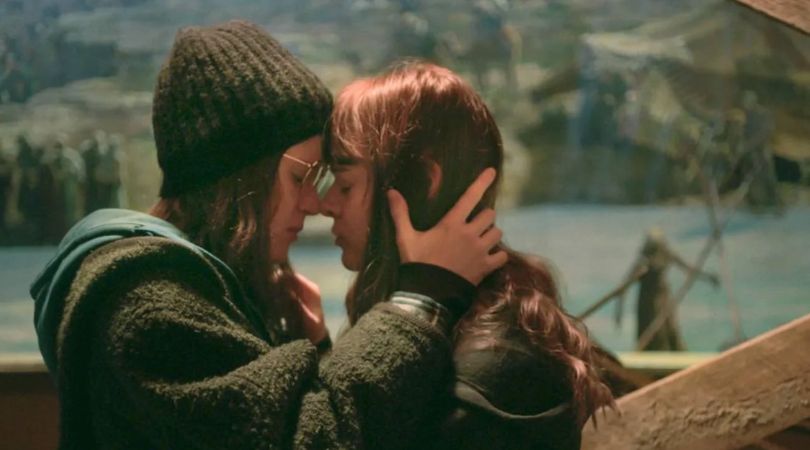
Not every relationship goes the way you hope it will. In Mark Slutsky and Sarah Watts‘ You Can Live Forever, all you can do is hope this isn’t the case. When Jaime (Anwen O’Driscoll) comes to live with her aunt and uncle for a while after her father dies, she meets Marike (June Laporte), and the two fall fast and hard in love. But can their love endure the cult-ish Jehova’s Witness enclave Marike and both their families are devoted to?
These star-crossed lovers are doomed from the start. The fundamentalist community they’re not only part of but that Marike is devoted to would never allow them to be together. It’s a really well-constructed predicament. Jaime grew up in the community, but her parents left it. Her aunt and uncle are all in, though, so she has both a kinship with the Jehovah’s Witnesses and an obligation to participate with them while she’s living there. Even though she very clearly doesn’t follow their beliefs and finds them rather abhorrent as a whole, Jaime can’t help but empathize with them, given her position. So she’s already compromised from the start when she and Marike begin to get close.
The way their relationship grows is tragic all along, but you just can’t look away. You want them to be together, but Marike is constantly pulled back into her religion. The way Jaime consistently obliges her in it without ever once pushing back is both painful and beautiful as you can see how her love is rending in both directions. As a viewer, too, you are so frustrated with how Jaime never stops to try and convince Marike that she’s in a cult and they need to leave. Because she is, and they do. But you are just as easily able to understand why she never does. It would probably ruin everything, for starters, and it wouldn’t be fair to do that to her. Plus, there’s maybe a tinge of belief somewhere in Jaime too. Or at least a longing for belonging that has her wishing she could just believe. It’s such an excellently constructed circumstance with no right answers, only pain.
The pain is all simmering on the inside, though, and underneath layers of a fun and joyful movie, before it all boils over eventually, anyway. Their navigation of first friendship then love is full of enjoyable teenage moments. They’re so joyfully awkward to watch pretty much the whole way through, and I love it—it just feels very real and very teen. Jaime does also make another friend in Nathan (Hasani Freeman), who is not a Jehovah’s Witness and serves as a confidant for her. I do wish they had a conversation at some point about the culty-ness of the Jehova’s Witness community instead of just dancing around it, but I’m glad for the moments they do share and that they’re allowed to just be friends without wearing out the tired trope of him coming onto her and her having to out herself to tell him no that we often get in these types of stories.
You Can Live Forever hits a climax in a scene I won’t describe but does get to the real heart of Jaime and Marike’s chasm of a difference in religious belief. The emotional argument they get into highlights both their acting, the dialogue, and the cinematography. It’s perhaps even one of the dramatic highlights of the whole Outfest LA film festival for me. And the emotional payoff it has on the prolonged epilogue that comes shortly after is devastating. For this final act alone, the film deserves to reach a wider audience. It ends in the least expected place for the least expected reason, yet, it feels as realistic as romantic stories could possibly end.
You Can Live Forever is an astounding tragedy constructed with enormous thought so as to hook you in, build up a wall of empathy, and then tear you down from the other side. I was expecting a good teenage romance, which I got, but I wasn’t expecting it to go where it went. All the empathy in the world doesn’t make the ending hurt any less, but at least the journey there was sweet.
You Can Live Forever screened at Outfest LA Film Festival 2022.
You Can Live Forever
-
Rating - 8.5/108.5/10
TL;DR
You Can Live Forever is an astounding tragedy constructed with enormous thought so as to hook you in, build up a wall of empathy, and then tear you down from the other side. I was expecting a good teenage romance, which I got, but I wasn’t expecting it to go where it went. All the empathy in the world doesn’t make the ending hurt any less, but at least the journey there was sweet.






